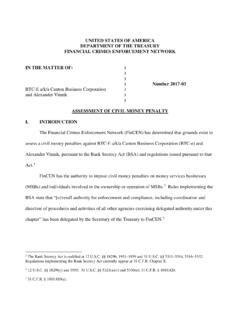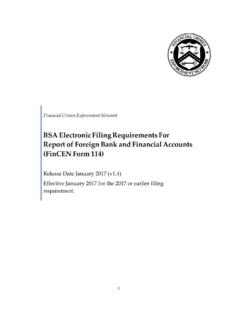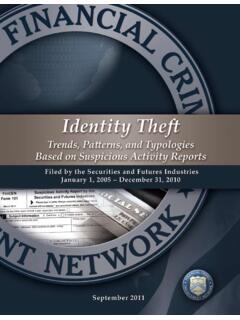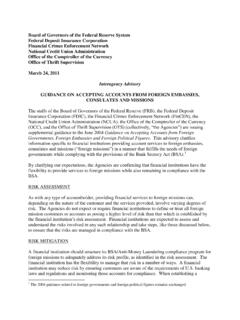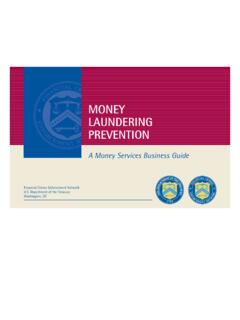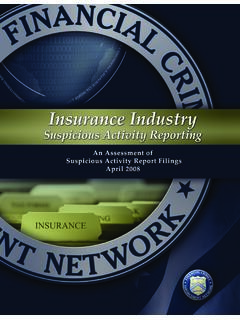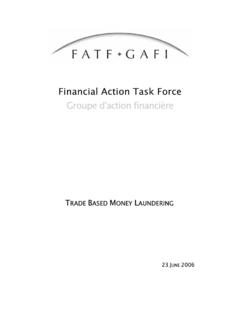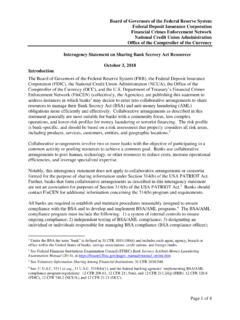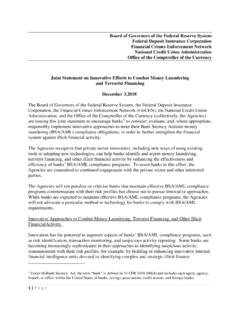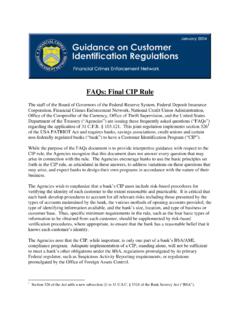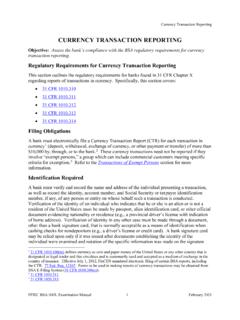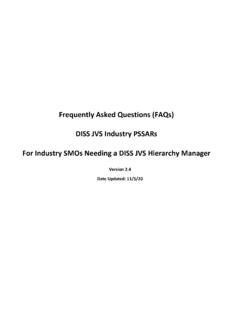Transcription of Answers to Frequently Asked Questions Regarding …
1 1 Board of Governors of the Federal Reserve System Federal Deposit Insurance Corporation Financial Crimes Enforcement Network National Credit Union Administration Office of the Comptroller of the CurrencyAnswers to Frequently Asked Questions Regarding Suspicious Activity Reporting and Other Anti-Money Laundering ConsiderationsJanuary 19, 2021 The Financial Crimes Enforcement Network (FinCEN), jointly with the Board of Governors of the Federal Reserve System (Federal Reserve), the Federal Deposit Insurance Corporation (FDIC), the National Credit Union Administration (NCUA), and the Office of the Comptroller of the Currency (OCC) (collectively, the Federal banking agencies), and in consultation with the staff of certain other federal functional regulators, is issuing Answers to Frequently Asked Questions (FAQs) Regarding suspicious activity reports (SARs) and other anti-money laundering (AML)
2 Considerations for financial institutions covered by SAR The Answers to these FAQs clarify the regulatory requirements related to SARs to assist such financial institutions with their compliance obligations, while enabling financial institutions to focus resources on activities that produce the greatest value to law enforcement agencies and other government users of Bank Secrecy Act (BSA) reporting. The Answers to these FAQs neither alter existing BSA/AML legal or regulatory requirements, nor establish new supervisory expectations; they were developed in response to recent Bank Secrecy Act Advisory Group (BSAAG) recommendations, as described in more detail in FinCEN s Advance Notice of Proposed Rulemaking (ANPRM) on Anti-Money Laundering Program Effectiveness, published in September 1: Requests by Law Enforcement for Financial Institutions to Maintain Accounts Can a financial institution maintain an account or customer relationship for which it has received a written keep open request from law enforcement, even though the financial institution has identified suspicious or potentially illicit activity?
3 31. Financial institutions subject to SAR requirements include: Banks (31 CFR ), Casinos and Card Clubs (31 CFR ), Money Services Businesses (31 CFR ), Brokers or Dealers in Securities (31 CFR ), Mutual Funds (31 CFR ), Insurance Companies (31 CFR ), Futures Commission Merchants and Introducing Brokers in Commodities (31 CFR ), Loan or Finance Companies (31 CFR ), and Housing Government Sponsored Enterprises (31 CFR ).2. See The response provided to this question clarifies current regulatory requirements. Under the recently-enacted Anti-Money Laundering Act of 2020, the Secretary of the Treasury is required to issue guidance on the required elements of a keep open request, which is forthcoming.
4 See 6306 of the Anti-Money Laundering Act of 2020, Pub. L. No. 116-283, 6001 6511 (enacted as Division F of the National Defense Authorization Act for Fiscal Year 2021).2 Yes. Law enforcement may have an interest in ensuring that certain accounts and customer relationships remain open notwithstanding suspicious or potential criminal activity in connection with the account. A financial institution may decide to maintain an account based on a written keep open request from a law enforcement agency, however, it is not obligated to do so. The written request should be specific and indicate both that the law enforcement agency has requested that the financial institution maintain the account, as well as the purpose and duration of the Keeping such an account open as requested may be highly useful to law enforcement and may further efforts to identify and combat money laundering, terrorist financing, and other illicit financial activities.
5 A financial institution should not be criticized solely for its decision to maintain an account relationship at the request of law enforcement or for its decision to close the account. Ultimately, the decision to maintain or close an account should be made by a financial institution in accordance with its own policies, procedures, and processes. It may be useful for financial institutions to maintain documentation of keep open requests, including after a request has expired. If financial institutions keep such an account open as requested by law enforcement, they are still required to comply with all applicable BSA requirements, including requirements to conduct ongoing risk-based monitoring, and, as appropriate, file SARs,5 including continuing activity SARs consistent with FinCEN 2: Receipt of Grand Jury Subpoenas/Law Enforcement Inquiries and SAR Filing Should a financial institution file a SAR solely on the basis of receiving a grand jury subpoena or other law enforcement inquiries?
6 No. The receipt of a law enforcement inquiry, such as a grand jury subpoena, does not by itself indicate that the criteria requiring the filing of a SAR have been met. However, receipt of a grand jury subpoena or other law enforcement inquiry is pertinent information relevant to a financial institution s overall assessment of risk and the risk profile for the relevant customer(s) and account(s). Generally, a financial institution will assess and review all relevant information it has about a customer that is the subject of a grand jury subpoena or other law enforcement inquiries, in accordance with its risk-based AML program.
7 For example, the receipt of a grand jury subpoena should cause a financial institution to review relevant account activity and A written request from a federal law enforcement agency should be issued by a supervisory agent or by an attorney within a United States Attorney s Office or another office of the Department of Justice. If a state or local law enforcement agency requests that an account be maintained, then the financial institution should obtain a written request from a supervisor of the state or local law enforcement agency or from an attorney within a state or local prosecutor s office. For additional guidance about the content of keep open requests, see Requests by Law Enforcement for Financial Institutions to Maintain Accounts, available at See 12 CFR , (k), (f), and (f) (Federal Reserve); 12 CFR 353 (FDIC); 12 CFR (c) (NCUA); 12 CFR and 12 CFR (OCC); and 31 CFR Chapter X (FinCEN).
8 6. See at p. See at p. financial institution should determine whether SAR filing is necessary based on its assessment of all information available and applicable regulatory requirements. If a financial institution files a SAR on a customer or transaction following the receipt of a grand jury subpoena or other law enforcement inquiry, the SAR should focus on the facts and circumstances that support a finding of suspicious activity rather than the subpoena or inquiry 3: Maintaining a Customer Relationship Following the Filing of a SAR or Multiple SARs Is a financial institution required to terminate a customer relationship following the filing of a SAR or multiple SARs?
9 No. There is no BSA regulatory requirement to terminate a customer relationship after the filing of a SAR or any number of SARs. The decision to maintain or close a customer relationship as a result of the identification of suspicious activity is a determination for a financial institution to make based on the information available to it, its assessment of money laundering or other illicit financial activity risks, and established policies, procedures, and processes. Financial institutions have the flexibility to develop risk-based procedures and monitoring processes for the purpose of updating the customer risk profile and determining when to maintain or close accounts.
10 Generally, financial institutions have policies, procedures, and processes in place that establish an escalation process for decisions to maintain or terminate customer relationships based on relevant factors, including SAR filing(s). These processes establish criteria, including when review by senior management and legal staff is warranted, for the decision to maintain or terminate the customer relationship in light of elevated risk factors. As indicated above, there is no specific number of SAR filings that a financial institution must consider to trigger any particular escalation step. Rather, the number of SAR filings and other factors that trigger escalation steps may vary based upon, among other things, the risk profile of the customer, including the geographical locations involved, the volume and type of transactions conducted by customers, the type of account, and the types of SARs filed by the financial institution in relation to the 4: SAR Filing on Negative News Identified in Media Searches Is a financial institution required to file a SAR based solely on negative news?
